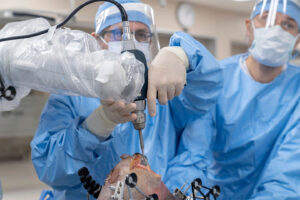
Complex Knee Injuries
Complex Knee Injuries:

When there is concern about a potential multi-ligament knee injury, it becomes essential to assess four primary ligament areas of the knee for potential damage. Within these regions, there may be multiple bundles or structures that require careful evaluation and, if necessary, reconstruction.
For in-depth insights into the assessment and management of knee ligament injuries, including details about these key ligament areas and the intricacies of potential reconstruction. Dr. Raviteja and the dedicated team provide expert guidance to ensure a thorough understanding and effective management of knee ligament injuries.
Complex Of Knee Types and Their Impact on the Knee:
When investigating potential multi-ligament knee injuries, it is crucial to assess four primary ligament areas within the knee: the anterior cruciate ligament (ACL), posterior cruciate ligament (PCL), posterolateral knee, and medial knee (MCL). Within these areas, there may be various bundles or structures that require thorough evaluation and, if necessary, reconstruction.
Complex of Knee:
The knee’s ligaments work cohesively to maintain overall stability in the joint. Opting for reconstruction of only a segment of the injured knee heightens the risk of future stretching of the reconstructed ligament. In the majority of cases, Dr. Raviteja recommends a comprehensive approach by advocating for multiple ligament reconstruction in a single setting.
Treatment for Knee Ligament Injuries:
Our meticulously designed multi-ligament reconstruction procedure is characterized by efficiency and a shorter duration. This streamlined process is made possible by our specialized surgical team, experts in the treatment of complex knee injuries. As a result, these surgeries are conducted with precision, ensuring a timely completion and sparing patients the need for two extensive surgeries spread over several months.
We emphasize the importance of consolidating all components of multi-ligament knee reconstructions into a single setting. This approach not only promotes efficiency but also enables patients to swiftly progress with their rehabilitation, facilitating a quicker return to their normal daily activities.
DR. Raviteja is skilled in diagnosing and treating the following injuries:
Knee Dislocation:
Dr. Raviteja and the dedicated team offer specialized expertise in addressing this condition, ensuring a thorough understanding and effective management. Learn more about the innovative approaches and personalized care available to individuals dealing with Knee Dislocation on the website.
Knee Instability | Multidirectional Instability:
Dr. Raviteja and the dedicated team provide specialized insights into the diagnosis and treatment of this condition. Explore the resources on the website to gain a comprehensive understanding of innovative approaches and personalized care available for individuals dealing with Knee Instability.
Knee Ligament Injuries | Complex Knee:
Dr. Raviteja and the dedicated team offer specialized expertise in the diagnosis and treatment of complex knee ligament issues. Discover valuable insights on the website, providing a comprehensive understanding of innovative approaches and personalized care tailored to individuals facing challenges associated with Knee Ligament Injuries.
Proximal Tibiofibular Joint Instability:
Dr. Raviteja and the dedicated team offer specialized expertise in the diagnosis and treatment of complex knee ligament issues. Discover valuable insights on the website, providing a comprehensive understanding of innovative approaches and personalized care tailored to individuals facing challenges associated with Knee Ligament Injuries.
Symptoms and Causes:
Osteoarthritis of the knee occurs when the cartilage in the knee joint undergoes wear and tear or sustains damage. This resilient, rubbery tissue, known as articular cartilage, covers the ends of your bones, facilitating smooth bending and movement. Similar to a car’s shock absorber protecting it from bumps, the meniscal cartilage in your knee absorbs shock from pressure.
Several factors contribute to the breakdown or damage of knee joint cartilage, including:
Weight-related factors: Individuals with a body mass index (BMI) of 30 or higher are seven times more likely to develop knee osteoarthritis.
Knee injuries: Past or recent injuries to the knee can increase the risk of osteoarthritis.
Repetitive stress: Regularly subjecting your knee to stress, whether through occupational activities or sports, can contribute to cartilage wear and tear.
Genetic predisposition: Inherited tendencies can make individuals more susceptible to developing osteoarthritis of the knee.
Structural factors: Having crooked bones or joints, such as knocked knees, can impact the distribution of stress on the knee joint, potentially leading to osteoarthritis.
Are you experiencing complex knee injuries?
There are two ways to initiate a consultation with Dr. Ravi Teja Rudraraju
You can provide current X-rays and/or MRIs for a clinical case review with with Dr. Ravi Teja Rudraraju
You can schedule an office consultation with Dr. Ravi Teja Rudraraju
Frequently Asked Questions
Provide an overview of what constitutes a complex knee injury, highlighting the involvement of multiple structures or ligaments.
Explore the various factors or incidents that can lead to complex knee injuries, such as trauma, accidents, or sports-related activities.
Detail the diagnostic process, including medical evaluations, imaging techniques, and other methods used to identify and assess complex knee injuries.
Outline the signs and symptoms that individuals with complex knee injuries may experience, such as pain, swelling, instability, etc.
Discuss non-surgical treatment options, such as physical therapy or bracing, for managing complex knee injuries.
Provide an overview of various surgical interventions, including reconstruction or repair procedures, for addressing complex knee injuries.
Outline the rehabilitation process, including exercises and therapies, designed to help individuals recover from complex knee injuries and regain functionality.
Discuss the expected recovery timelines, emphasizing the variability based on the severity of the injury and the chosen treatment approach.
Address potential long-term effects or complications associated with complex knee injuries, including the importance of ongoing monitoring and care.
Offer preventive measures, such as proper warm-up routines, protective gear, and safe practices, to minimize the risk of developing complex knee injuries.
Conclusion:
At Dr. Ravi Teja’s clinic, we are dedicated to understanding, diagnosing, and treating Complex of Knee effectively. If you’re ready to take the next step towards relief, feel free to initiate a consultation through X-ray and MRI reviews or schedule an in-person visit. We look forward to guiding you on your journey to improved knee health.
Latest Post

